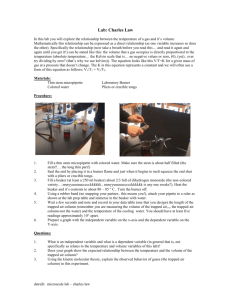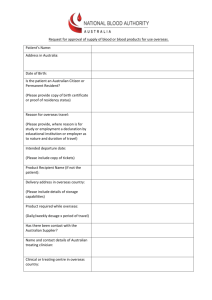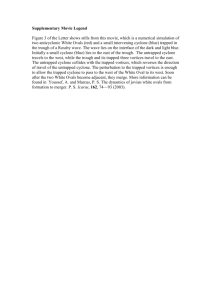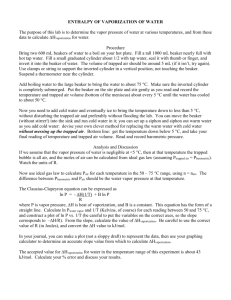Cash-trapped: the challenge of managing cash across borders
advertisement
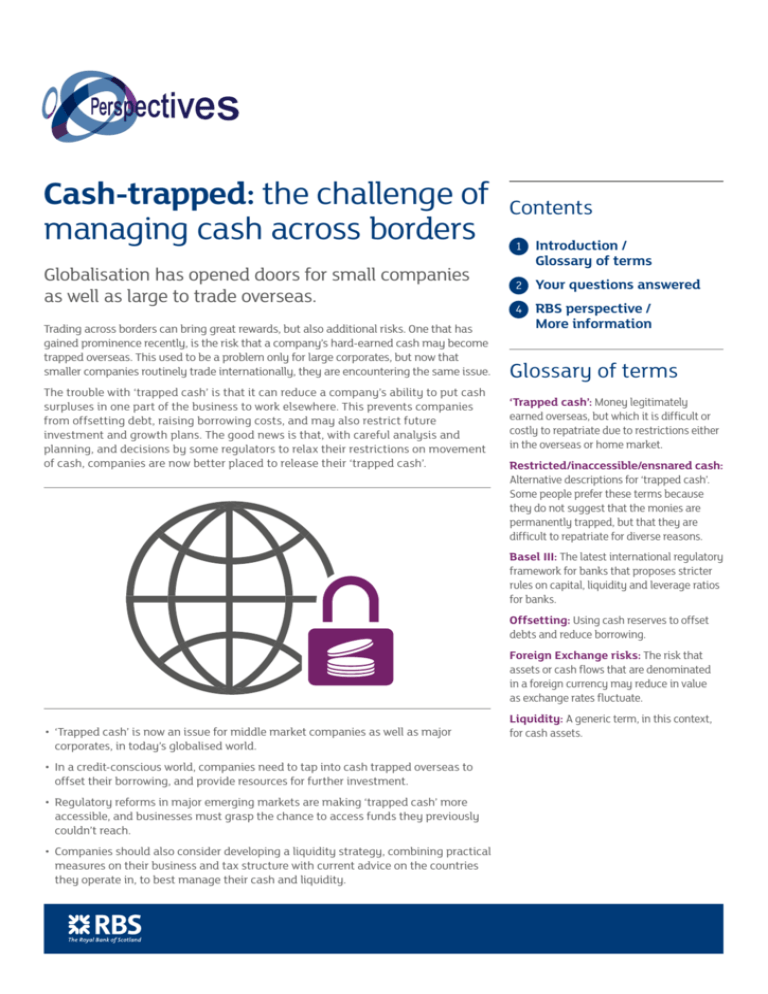
Cash-trapped: the challenge of managing cash across borders Globalisation has opened doors for small companies as well as large to trade overseas. Trading across borders can bring great rewards, but also additional risks. One that has gained prominence recently, is the risk that a company’s hard-earned cash may become trapped overseas. This used to be a problem only for large corporates, but now that smaller companies routinely trade internationally, they are encountering the same issue. The trouble with ‘trapped cash’ is that it can reduce a company’s ability to put cash surpluses in one part of the business to work elsewhere. This prevents companies from offsetting debt, raising borrowing costs, and may also restrict future investment and growth plans. The good news is that, with careful analysis and planning, and decisions by some regulators to relax their restrictions on movement of cash, companies are now better placed to release their ‘trapped cash’. Contents 1 I ntroduction / Glossary of terms 2 Your questions answered 4 BS perspective / R More information Glossary of terms ‘Trapped cash’: Money legitimately earned overseas, but which it is difficult or costly to repatriate due to restrictions either in the overseas or home market. Restricted/inaccessible/ensnared cash: Alternative descriptions for ‘trapped cash’. Some people prefer these terms because they do not suggest that the monies are permanently trapped, but that they are difficult to repatriate for diverse reasons. Basel III: The latest international regulatory framework for banks that proposes stricter rules on capital, liquidity and leverage ratios for banks. Offsetting: Using cash reserves to offset debts and reduce borrowing. Foreign Exchange risks: The risk that assets or cash flows that are denominated in a foreign currency may reduce in value as exchange rates fluctuate. • ‘Trapped cash’ is now an issue for middle market companies as well as major corporates, in today’s globalised world. • In a credit-conscious world, companies need to tap into cash trapped overseas to offset their borrowing, and provide resources for further investment. • Regulatory reforms in major emerging markets are making ‘trapped cash’ more accessible, and businesses must grasp the chance to access funds they previously couldn’t reach. • Companies should also consider developing a liquidity strategy, combining practical measures on their business and tax structure with current advice on the countries they operate in, to best manage their cash and liquidity. Liquidity: A generic term, in this context, for cash assets. Your questions answered What is ‘trapped cash’ and why does it matter? ‘Trapped cash’ is an umbrella term for cash that an international business has generated overseas, and which, for a number of reasons, they are unable to repatriate to their home country. Often, ‘trapped cash’ is not actually permanently trapped, but it is difficult, time-consuming or expensive to bring home. The issue of ‘trapped cash’ has been around for a long time, but it has become a more urgent issue for many companies in recent years. It now rarely makes economic sense to have surplus cash languishing overseas. Prudent financial management would suggest that companies should use their internal resources to reduce or offset debt, rather than to seek to increase borrowings. And by placing greater emphasis on sound cash and liquidity management, a company can not only offset existing debt but also invest to grow its business without seeking new credit. With so many companies now trading internationally, there are also encouraging developments from regulators to make ‘trapped cash’ more accessible, particularly in a number of key emerging markets. For example, China, India, Malaysia, Russia and Turkey have all initiated reforms to address these issues (see page 3 for more information). What are the main reasons for cash being trapped? Cash may be trapped in some parts of the world due to local or external factors, or a combination of both. These may include: Which jurisdictions are most affected by ‘trapped cash’ issues? A survey by EuroFinance found that China was the largest location for ‘trapped cash’ – unsurprisingly, given China’s huge importance in the world economy. Overall, the problem arises mostly in emerging markets, across eastern Europe, Asia and Latin America. ! Global top 10 locations for ‘Trapped Cash’ Regulatory restrictions in the host country, such as: • foreign exchange controls – e.g. on converting and transferring currencies. • c apital requirements – e.g. capital has to remain onshore for a certain period. • regulations – e.g. restrictions on intercompany lending. • t axation – e.g. on cross-border cash flows, or high withholding taxes on dividends paid. Tax issues, such as: • d omestic tax treatment of overseas cash, which can discourage its repatriation. This is a problem particularly in the US, where the relatively high corporate tax rate (at 35%) is payable when earnings are repatriated, prompting many US companies to leave large amounts of cash overseas. • r e-patriation of cash as either dividends or intercompany loans, which can possibly result in the deduction of withholding tax depending on the jurisdictions involved. Perspectives 2 ‘Trapped cash’ 1. China 2. Argentina/Brazil 4. Venezuela 5. India 6. South Korea 7. Thailand 8. Russia 9. South Africa 10. Algeria/Indonesia/Malaysia/Turkey Source: EuroFinance Corporate Treasury Network survey Your questions answered How can I get my ‘trapped cash’ back? As there are so many variables – in company type and size, regulations and tax treatment in different countries, there is no ‘one size fits all’ solution. International banks offer a number of products to mitigate ‘trapped cash’ issues such as cross-border cash optimisation and cross-currency notional pooling products, but these tend only to be practical for very large businesses, which already have liquidity strategies in place. Smaller companies should first consider a range of practical measures to understand and manage the issue, such as: What regulatory reforms should I be aware of? There are rapid changes in regulation, especially in emerging markets, which will benefit international companies with cash held overseas, some of which are summarised below. But this is a fastchanging area, so always seek professional guidance from accountants, lawyers and bankers on your operations in any given country before taking any action. China • A UK-China treaty has reduced tax rates on dividends, royalties and service fees, making it more tax efficient for UK companies to remove funds from China. Using some of the tools and technology to track and see balances around the globe; Deciding whether to maintain currency accounts inside or outside of the country in question. You may incur transaction costs for receiving and paying money, but it can also give you easier access to that cash; • The People’s Bank of China, China’s central bank, is relaxing controls on cross-border renminbi flows, and reiterating its long-term aim to allow renminbi conversion to other currencies for capital account transactions. • Pilot schemes to repatriate ‘trapped cash’ in China have been launched with central bank approval. They target cross-border intercompany lending and cross-border netting and allow firms to tap into internal sources of liquidity and reduce funding costs. India Where possible, encouraging customers to pay in GBP or another easily convertible currency; Naturally ‘hedging’ your foreign currency or currencies, by incurring expenses against income you are generating in that currency. Second, they should consider developing a formal liquidity strategy, in consultation with specialist advisers. This would involve conducting in-depth analysis of relevant countries’ laws, their own business and cash management structure, and their tax setup, to best manage their cash and liquidity. If you have not already built up cash balances overseas, then prevention will be better than a cure. Before investing in new markets, companies should do their research into local regulations and restrictions on the movement of cash, and draw up an investment strategy to mitigate the risk of ‘trapped cash’. Perspectives 3 ‘Trapped cash’ • Companies in India can now lend money to overseas subsidiaries, provided the amount does not exceed 400% of their net worth. Malaysia • Capital account restrictions are being lifted. Russia and Turkey • Regulatory changes are now allowing companies to invest abroad. ‘Trapped cash’ can harm your company’s health Cash surpluses unable to be put to work elsewhere in the business Taxes on funds remitted overseas Increased borrowing costs across the enterprise as a whole Rapid changes in regulation, especially in emerging markets RBS perspective As companies conduct more business internationally, the issue of how to bring cash generated overseas back home is well worth considering, as many emerging markets have regulations that restrict the movement of cash beyond their borders. Having cash trapped overseas can leave a company strapped for cash at home, so it pays to have a strategy to address this. Regulatory changes also create the need to revisit this issue. For example, Basel III regulations will increase capital requirements for banks. Conversely, in some markets, such as China, regulations are being relaxed to allow companies to repatriate their cash more easily, which is good news for any business trading internationally. Existing cash management structures may not be fit for purpose When the world economy was booming, companies didn’t worry too much about their overseas cash. In today’s more difficult economic conditions, putting cash surpluses you have built up overseas to work elsewhere can only benefit your business. There is no silver bullet to doing this, as every company’s needs will be different. But by reviewing their organisational structure and tax arrangements, their cash management structure, earnings and expenses, companies have a great opportunity to improve their liquidity, and make best use of all the cash they are holding around the world. Perspectives 4 ‘Trapped cash’ Where do I go for more information? For an overview of ‘The Trapped Cash Conundrum’, see this article from the Association of Corporate Treasurers: www.treasurers.org/node/8474 For more information, speak to your Relationship Manager or call the RBS Hotline on 0800 210 0235 Text Relay 18001 0800 210 0235 Lines are open 9am-5pm Monday to Friday (excluding public holidays). Calls may be recorded.
